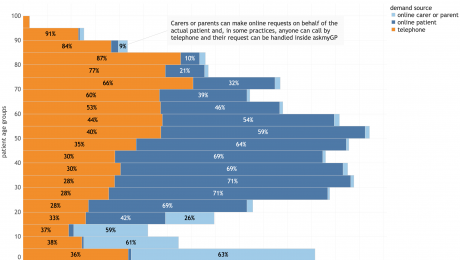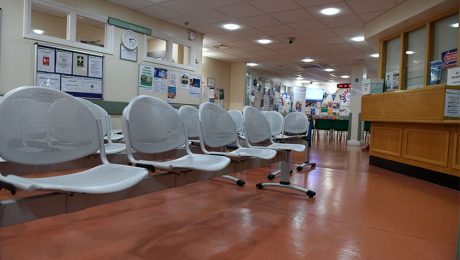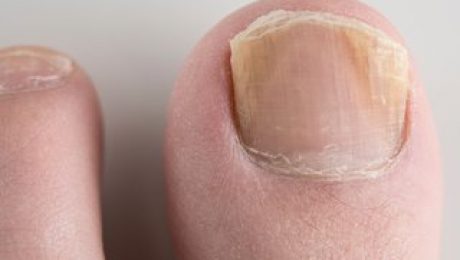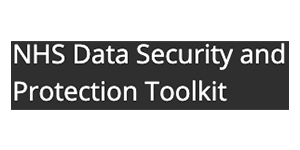Age specific adoption of online consultations
Context
The latest data from our chief analyst Dr Steve Black (@sib313) shows remarkable adoption of online consultations across all ages and 10 diverse practices. n = 37,674 requests, date range is 1/1/2019 to 8/2/2019.
The context is all askmyGP practices operating in “total flow” mode where all patient demand goes through the system in two modes. Online, patients submit a request for help from their NHS GP practice either for themselves (dark blue) or as a proxy (light blue), mostly children but also vulnerable adults, most over 75. They may also telephone the practice, and a receptionist creates the request on their behalf (orange).
The key point is that all demand is covered in the chart, not from a self-selected subset of patients, and these are regular GP practices where there is no change in registration.
What the data shows
For infants and children, over 60% of parents chose to send their request online.
For young adults aged 20 – 40, over 70% submitted online.
With increasing age, the proportion online falls slowly, but even at 65 – 70 it is 40%.
Over 70 the proportion falls more steeply and significant numbers are by proxy.
Policy implications
It is clear that when designed for ease of use and universality in respect of patients and their medical problems, coupled with rapid response by providers, the online offer is highly attractive to patients.
The vision for “digital-first” providers who are at the same time traditional, local GP practices is achievable and already being achieved.
Harry Longman
Founder, Chief Executive, askmyGP
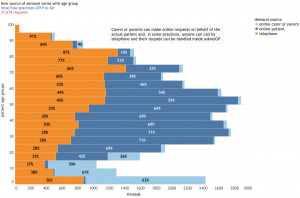
- Published in Evidence
The network’s the thing
I’ve had a bit of time to absorb the new GP contract – there’s an excellent summary on GP Online if you don’t want to read it all. While some of the digital notes are a tad off key, I suspect they are a nod to our technophile SoS while the real action is elsewhere.
The centrepiece is Primary Care Networks, PCNs, and we are going to hear lots and lots more about them. Notice how the language has changed, as until quite recently it was all about “GP at scale”, a phrase absent from both BMA and NHS England texts.
Hats off to Richard Vautrey and team.
While the numbers “30 – 50,000” are the same, rather than large scale providers for which no convincing evidence was ever produced, networks of existing providers with no change of scale could make sense.
Steel mills need economies of scale, but GPs don’t, and diseconomies of scale soon show up with loss of continuity, local accessibility and lower patient satisfaction all well known.
But some AHP resources don’t really work at smaller practice level, and it’s clunky to employ for example a pharmacist for 7 hours a week and a physio for 12. At the network level they could work well, and indeed this could rebalance the funding model in favour of smaller practices as funds and resources will be based on list size.
The DES incentivises all practices join a network, and there will be a dash to join up with “people we like” at the local level. Expect a few funny shaped contiguous groups, some larger and some smaller than prescribed, but with a little pushing and shoving the money will ensure it happens.
The labels don’t all say this, but a very large proportion of the new money will effectively go into core funding, and will strengthen GMS partnerships as indeed the Watson review said they should be strengthened. This is a good thing for GP, for the NHS and the population as a whole.
The new and interesting questions arise over how the networks will operate. 22,000 new primary care staff is a lot to take on board, considering only how they are recruited, trained and managed.
Any shared resource raises the problem of “the freedom of the commons”. Currently, the design of A&E, urgent care centres, 111 and so on means they soak up demand from poorly performing GP practices. The reward for failure is for someone else to take your work.
How will the the new AHPs be shared fairly, so quality is rewarded as it should be? (by the way, fair is not the same as equal. Consider the student practice in the seaside town)
Practically, how will GPs make best use of them, appropriately referring the right patients at the right time? What is the patient view?
How will network performance be measured? How soon will patients get the right help? How will outcomes show we’re getting value for money?
No doubt we will return to these themes.
Cogitate as well as celebrate this weekend.
Harry Longman
PS No network yet, but already there with 100% of patients offered online and video consultations, Dr Barry Sullman talks about Balaam St Surgery and astonishing return on investment.
He’s a traditional, local, digital-first practice. Fabulous.
- Published in Comment
New GP contract: more work, less output
Hurrah! NHS England and the BMA GPC have agreed a new contract covering the next five years.
Apparently there’s lots more money, funding for 22,000 addtional health workers in primary and community care, and everyone seems very happy with it. I couldn’t possibly digest the whole lot but will concentrate on what we know best.
This is going to increase GP workload and cut patient access.
How so? See the fine print in the IT and digital section.
1. NHS111 will have the right to book directly into 1 appointment slot per 3,000 patients (rounded down) per day.
Leave aside the technical issues, problems of policing the scheme and arguments over unused slots, late booking and so on, what would happen even if it did work perfectly?
In a traditional practice with more patient demand than available slots, they tend to be all booked up within minutes of reception opening. You know, we know, everybody knows.
So now what does the savvy patient do? Call NHS111. Go through all the palaver of identifying themselves, answering dozens of irrelevant yet scary questions, eventually landing with “I need to see the GP. And I have a right to one of those 2 appointments in my practice of 8,999 patients, today.”
Boom, they got it. But they got the second one and there is no way of telling the other 23 patients who were turned away by the practice, so all of them go through the NHS111 palaver again, but get the same message: all slots gone.
So we’ve wasted NHS and patients’ time, added a bunch of complexity, and increased GP capacity by precisely zero.
And by the way, what do GPs think of the ability of NHS111 to triage a patient and provide concise and relevant detail of the conversation? Do ask one.
2. Make 25% of appts bookable online?
It is now such a commonplace that we kind of assume everyone knows this: only about one third of patients seeking help from their GP need a face to face appointment.
Which means that if GP capacity is reserved for patients to decide for themselves to take a slot, two thirds will be wasted. So that’s 17% of GP capacity to be wasted by design. Maybe they will include telephone appointments, which would be less wasteful but still may not be appropriate.
Reserving any proportion for a single channel reduces equity of access: those with no online capability, often the most vulnerable and needy, are shut out of 25% of available capacity.
It could be so much better, simpler and cheaper.
Here’s what our practices are already doing:
1. When they are open, there is always capacity, so no need to call 111 to try for reserved slots. They won’t be used, but neither will the GPs waste the time, they’ll just crack on.
2. Make 100% of capacity available online – that’s normal, it’s what we do. But 100% of capacity is also available for patients who phone in – there is complete equity of access.
It’s the same capacity. But how it is used for each patient is up to the GP to decide, which they do in seconds through digital triage – they don’t even need to phone many patients.
It takes two to tango, and the tragic missed opportunity here is that both GPC and NHS are stuck in supply thinking: it’s all about pushing services at patients, wrapped up in complex funding rules.
Demand led thinking does exactly the reverse, understanding in great depth and detail the incoming demands and designing services around them. We’d get bucketloads of efficiency as well as astonishing performance if they did that. (Do call, best rates for hard up government departments)
Well, I always say that when they’ve tried everything else that doesn’t work, they’ll be back. Maybe before I’m dead.
Why take the risk, start now!
Harry Longman
01509 816293 / 07939 148618
PS We’ve been amazed by the views on our new video, Dr Barry Sullman talking about Balaam St Surgery.
He’s a traditional, local, digital-first practice. Fabulous.
- Published in Comment
They can’t both be right
Do you ever wonder about that phrase “local needs”?
It made me wonder whether say Facebook had ever been asked to do a local needs version.
It’s just that we are responding to tenders issued by different CCGs, which are remarkably different given that I thought patients had roughly the same range of diseases wherever they live.
Essential requirement A: “Is able to fully triage the patient and signpost to the most appropriate service with no GP intervention”
Essential requirement B: “The system should not perform an automated triage that gives a disposition”
Imagine a pharma procurement where A specifies that it shall raise the patient’s blood pressure, and B that it shall lower it.
There’s a national specification for online consultations and question of what the computer actually does with the patient request seems central to the whole scheme… you couldn’t make it up.
Whether it’s more surprising or saddening I don’t know, but there is now a subastantial body of evidence of what doesn’t work in online consultations, and it includes much of what is being specified:
– no safe & economic automated triage has been invented
– lengthy questionnaires lead to very low usage, under 1%
– there is no evidence of online channels reducing oveall demand.
Despite all this, specifications are full of wishful thinking which will simply result in more taxpayers’ money being flushed down the toilet.
But perhaps what’s less well known is the evidence of what does work.
We’re just about to release a new video case study which is an inspiration. Final checks are being done, and I’ll tell you all about it tomorrow.
Harry Longman
PS the GP in question wrote to me yesterday “I am laughing and dancing” When you see the video you might assume we paid them for it. No, they pay us from their own partner income, just a regular customer.
- Published in Comment
The NHS App and the toenail test
Today I return to that long term plan and a piece of it which has so tickled the national consciousness that it made the News Quiz.
To touch quickly on “Skype consultations”. Skype for various reasons is problematic – it requires both parties to have a login, whereas our video solution works with a one time link. But headlines have been overblown. We now know that when offered the choice, only about 1 in 1000 patients are choosing video. It may grow a bit, but I don’t see it becoming a huge channel.
Let’s move on to the NHS App.
I will share a little of my medical history, and I hope you don’t find this too much information, but I get fungal nail infection.
So in the interests of science I wanted to test how the NHS App would help with my condition, using its 111 online algorithm, and my presenting symptoms of “brown and broken toenails”.
You can see the whole process in this 3 minute video which is how long it took.
It asked me 12 questions, of which 1 was possibly relevant, 10 irrelevant and 1 frankly embarrassing. The outcome was self care, but with absolutely no specific advice on what to do.
I have tried the same input with the Babylon AI chatbot, which couldn’t find anything relevant and asked whether I had any more symptoms (as if the waiter told me the fish option was off).
I have tried the same input with EMIS Patient.info. Its first option was “Fibre and Fibre Supplements” on which I clicked, and they tried to sell me a hearing aid.
I have tried the same input with NHS Choices, and the first option was sepsis, that well known affliction of toenails, though it did have Nail Problems as the fifth item, which does have relevant information on fungal nail.
I gather about 10% of the population has this, and whenever I mention “brown and broken toenails” to a doctor, the first thing they say to me, without even looking, is “fungal nail”.
If the might of government, of major corporations and £millions of venture capital can’t get toenails right, what hope have they when conditions are complicated and serious? I must leave the question with those qualified to assess them.
On Twitter Dr Dave Triska writes:
“I consulted with 3 people today with a near identical ‘cough’ presentation, recognised the ill one (whom I knew to be stoic and was concerned they had contacted me). Guess what? Sick. As. Algorithm would have missed that.
I just tried my sick patient will all big 3 symptoms checkers. All falsely reassured. From an algorithm point of view, they were right. Likely URTI. Except it wasn’t…
How would I program into an algorithm that the barn door URTI I did also bring down needed to be seen because I knew they’d lost someone to lung cancer and would be worried? That a visit and chat helped them in ways that aren’t measurable against outcomes?”
All falsely reassured.
No doubt you find that very concerning, but consider the specification on which we were invited to bid by a CCG yesterday:
Essential criterion: “Is able to fully triage the patient and signpost to the most appropriate service with no GP intervention using a solution where indemnity lies with the supplier and not the practice”
You’re welcome.
Harry Longman
PS. We do offer self care help with askmyGP, but we don’t claim that it reduces demand or diverts patients. We aim to make it as fast and simple as possible. Please try it yourself, with “brown and broken toenails” or anything else. This is exactly what your patients would see.
Try Bramley Demo Surgery, patient facing
Did we meet the aim?
- Published in Comment
Encouraging, Dangerous, Lackadaisical
So the NHS long term plan has landed and it’s a techie one. Should we be happy?
As a part-time nerd myself I can’t help but feel the enthusiasm with the word “digital” appearing no less than 14 times in this single page on primary and outpatient care.
“Over the next five years every patient in England will have a new right to choose this (digital first) option – usually from their own practice or, if they prefer, from one of the new digital GP providers.”
I’m going to describe it with three words you wouldn’t normally put together.
Encouraging – Matt Hancock has clearly recognised how far behind the NHS is in patient service, and how new technology can help. I agree on tech enabled, but tech driven is something else.
Dangerous – shifting the ground rules to move patients away from their own local NHS GP will do immeasurable damage to the long term continuity of care integral to the registered list system, and in so doing undermine the professional careers of GPs. Test this idea against Prof Chris Salisbury’s Mackenzie Lecture – the transcript now with illustrations is a must read.
Lackadaisical – with many patients forced to wait three weeks for an appointment, why make them wait five years for change? We’re turning regular NHS practices into digital first practices overnight (well, with four weeks preparation, then overnight). Digital first because all patients are welcome online, but not forced online, and we’re seeing over 60% from day one.
Day one feedback, today: “Seeing its a new introduction, I think its fantastic. The helpfulness, the speed, and the results. Thank you.” Gentleman, 71, Weston-super-Mare.
Come on Matt, keep up!
Harry Longman
- Published in Comment
Fly me to the moon
What a year it has been already. First NASA’s New Horizons discovers a snowman at the edge of the solar system, then Chang’e 4 lands in a crater on the far side of the moon.
What are your dreams for 2019?
I learned this week from the little museum in Grantham that Margaret Thatcher’s father inspired her with the idea that “if you can think it, you can do it” (Love her or loathe her, there’s no question that she changed Britain. Yes, it was a small grocer’s shop, away from the town centre and no indoor bathroom).
So our dream for 2019 is that as we bring about happier patients and happier GPs, we help the profession to be more of what it is meant to be.
What is general practice meant to be?
My discovery of the week was the RCGP James Mackenzie Lecture given on 20th December by Prof Chris Salisbury. What better title than “Designing healthcare for the people who need it.”?
Christmas and New Year are past, we’re getting the house straight again, and have more time to reflect. So I have a little work for you today:
Listen in full to Prof Salisbury’s lecture on Youtube.
In under 50 minutes you will need to think, you will be challenged, you will laugh, and yet you will know it makes sense. You will contrast the conceptual strength of GP with the failures of implementation.
You will hear the most comprehensive and cogent critique of recent policy I’ve come across. If you are an optimist, you will nonetheless come away with hope that while change is necessary, if we can think it, we can do it..
We’ve had an exciting start to the year with a practice launch on 2nd January in Lincolnshire (clue!), two more next week in Somerset and an accelerating programme through the winter.
I don’t know where we’ll be at the end of the year but I know it will be absolutely focussed on implementation. Thank you Chris for helping us understand what it’s for.
If you’ve heard it once, listen again.
Download the full transcript with pictures.
Have a bolder and happier New Year,
Harry Longman
PS I’m ambivalent about Thatcher but she was right about a lot of things. A banner in the museum, “I want to turn us from a nation of “Wait until it’s given to you” to one of “Do it yourself””.
People of every political stripe can sign up to that. By the way, we’re looking for GPs with that attitude.
PPS The response has been huge already for our free Digital Triage Experience, and we have now enabled the first user in each practice to invite their colleagues. Compare notes on how you triaged each of the 50 cases and the time you saved.
- Published in Comment

